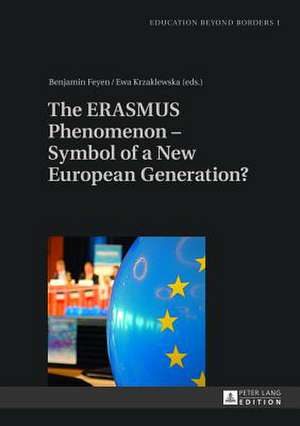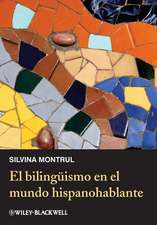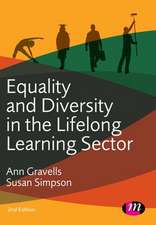The Erasmus Phenomenon - Symbol of a New European Generation?: Kirchliche, Kommunale: Education Beyond Borders, cartea 1
Editat de Benjamin Feyen, Ewa Krzaklewskaen Limba Engleză Hardback – 26 iun 2013
Preț: 482.86 lei
Nou
Puncte Express: 724
Preț estimativ în valută:
92.40€ • 95.89$ • 77.24£
92.40€ • 95.89$ • 77.24£
Carte tipărită la comandă
Livrare economică 17-31 martie
Preluare comenzi: 021 569.72.76
Specificații
ISBN-13: 9783631627198
ISBN-10: 363162719X
Pagini: 245
Dimensiuni: 152 x 211 x 20 mm
Greutate: 0.43 kg
Editura: Peter Lang Gmbh, Internationaler Verlag Der W
Seria Education Beyond Borders
ISBN-10: 363162719X
Pagini: 245
Dimensiuni: 152 x 211 x 20 mm
Greutate: 0.43 kg
Editura: Peter Lang Gmbh, Internationaler Verlag Der W
Seria Education Beyond Borders
Notă biografică
Benjamin Feyen is researcher at the Institute of Social Sciences at Heinrich Heine University Düsseldorf (Germany). Ewa Krzaklewska is researcher at the Institute of Sociology at Jagiellonian University in Krakow (Poland). Both have been concerned with ERASMUS as exchange students, as members of the Erasmus Student Network organisation, and as academic researchers.
Cuprins
Inhalt: Benjamin Feyen/Ewa Krzaklewska: The ERASMUS Programme and the «Generation ERASMUS» - A Short Overview - Benjamin Feyen: The Making of a Success Story: The Creation of the ERASMUS Programme in the Historical Context - Ulrike Klose: Learning for Life? The New Role of the ERASMUS Programme in the Knowledge Society - Hannah-Kristin Elenschneider: Das ERASMUS-Programm: Symbol einer europäisch geprägten Auswärtigen Kultur- und Bildungspolitik der Bundesrepublik Deutschland? - Friedrich Heger: ERASMUS - for All? Structural Challenges of the EU's Exchange Programme - Ewa Krzaklewska: ERASMUS Students between Youth and Adulthood: Analysis of the Biographical Experience - Johanna Damerau: Mit Händen und Füßen durch das Leben: ERASMUS-Studenten und ihre (nonverbale) interkulturelle Kommunikation - Ewa Krzaklewska/Paulina Skórska: Culture Shock during ERASMUS Exchange - Determinants, Processes, Prevention - Larissa Wood: Social ERASMUS? Active Citizenship among Exchange Students - Gioia Ambrosi: The Influence of the ERASMUS Programme on Strengthening a European Identity: Case Studies of Spanish and British Exchange Students - Christof Van Mol: ERASMUS Student Mobility and the Discovery of New European Horizons - Agnieszka Roguski: «Ich bin ERASMUS» - Identitätsschöpfung durch die virtuelle Konstanz einer visuellen Gemeinschaft? - Jennifer Striebeck: A Matter of Belonging and Trust: The Creation of a European Identity through the ERASMUS Programme? - Seweryn Krupnik/Ewa Krzaklewska: Researching the Impact of ERASMUS on European Identification - Proposal for a Conceptual Framework - Benjamin Feyen/Ewa Krzaklewska: «Generation ERASMUS» - The New Europeans? A Reflection.












